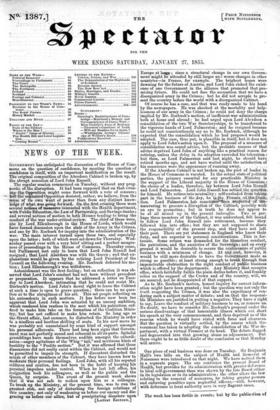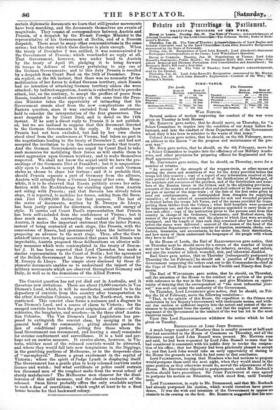certain diplomatic documents we learn that still greater movements have
been marching, and the documents themselves are events of magnitude. They consist of correspondence between Austria and Prussia, of a despatch by the French Foreign Minister to the representative of his Government at Berlin, and of a Russian despatch. There must be many other communications in the sense- series; but the story which these disclose is plain enough. When the treaty of December 2 was ratified, it was communicated to the Government of Prussia ; which vouchsafed no reply at all. That Government, however, was under bond to Austria by the treaty of April 20, pledging it to bring forward its troops in defence of territory pertaining to any one of the German Governments ; and to this duty Prussia is recalled by a despatch from Count Buol on the 24th of December. Prus- sia replied, on the 5th instant, that there was no necessity for the mobilization of her forces to defend German territory, since Russia had no intention of attacking German territory unless she were attached; by indirect suggestion, Austria is exhorted not to provoke attack, but, on the contrary, to accept the proffers of peace from Russia, tendered in evident sincerity ; at the same time the Prus- sian Minister takes the opportunity of intimating that his Government stands aloof from the new complications on the Eastern question, since it was excluded from the conferences held to consider the interpretation of the four guarantees. The next despatch is by Count Boo], and is dated on the 14th instant. If he sent a direct reply to Prussia it is not publish- ed, but we are inclined to suppose that this document directed to the German Governments is the reply. It explains how Prussia had not been excluded, but had by her own choice stood aloof from the conferences at Vienna, had taken no part in the negotiations leading to the treaty of December 2, and had net accepted the invitation to join the conferences under that treaty. And the German Governments are urged by Count Buol to take such measures for mobilizing their forces as will enable them to resist aggression upon German territory, and to make themselves respected. We shall not know the sequel until we have the pro- oe:tugs of the Germanic Diet at Frankfort; but it is unquestion- ably open to Austria to accept the cooperation of such German states as choose to share her fortune ; and it is probable that, should Prussia separate a part of Germany from the alliance, Austria will actually form a German League of her own. Mean- while, it is to be observed that Russia publicly avows her satis- faction with the Mecklenbergs for standing apart from Austria and siding with Prussia ; and that Bavaria has already taken steps, it is reported, to mobilize her forces, asking from the Bava- rian Diet 15,000,000 florins for that purpose. The last of the series of documents, written by M. Drouyn de Lhuys, has been justly praised for directness, clearness, and energy of style. It carries out Count BuoPs representation that Prussia has been self-excluded from the conferences at Vienna ; but it does much more. In contrasting the conduct of Prussia and Austria, it makes the important statement that the latter Power, instead of being contented at each stage, like Prussia, with the concessions of Russia, had spontaneously taken the initiative in proposing an advance to the next stage. Thus, after the Gort- schakoff interview, having ascertained that peace with Russia was improbable, Austria proposed those deliberations on ulterior mili- tary measures which were contemplated in the treaty of Decem- ber 2. It has been reported that Lord Clarendon has made- a similar representation to the Court of Berlin;- but the agreement of the British Government in these views is distinctly stated by M. Drouyn de Lhttys. The simple story disclosed by these di- plomatic documents enables us to understand the import of the military movements which are observed throughout Germany and Italy, as well as in the dominions of the Allied Powers.



































